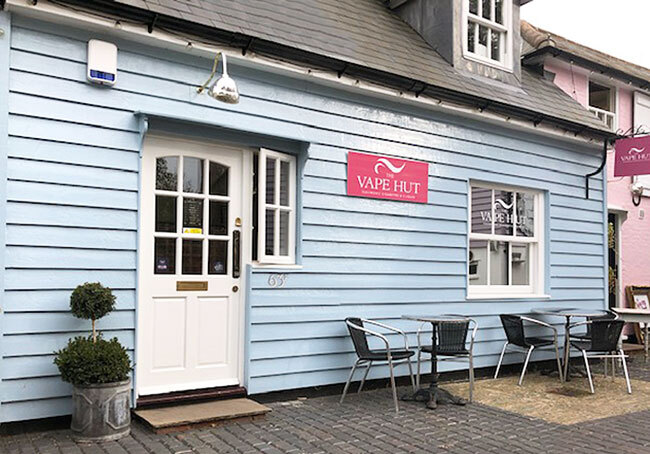How to Finance a Vape Shop
Published by Rob Brown
So you want to set up your own vape shop. You’ve found a location, have a product wish list as long as your arm and have gone all Laurence Llewelyn Bowen with your store design.
But there’s a problem: cash. Or lack of it. And getting finance out of the bank manager these days is about as easy as convincing Dot Cotton to give up the fags. So, what next?
How to finance a vape shop
First, you need a cast iron business plan. No one’s going to stump up the cash without being convinced you know your stuff. And the only way to get to grips with how much this is going to cost – and when you and your investors will see a return – is by doing your homework.
Lots of it. “It took us around four months to fully complete our business plan and get the final approval for our loan,” says Ryan Michlig, director of Northampton based Right Vape, which began trading in 2017 with backing from a specialist loan company.
“Writing the plan had its difficulties because we had to forecast for a business that didn’t exist to ascertain its viability. Having said that, it was such an important process as it allowed us to see exactly which direction we were going in when we set up our vape shop.”

Get help with your business plan
Help is at hand for newcomers. Michlig received mentoring at the planning stages of his venture from his lender and most specialist financers offer similar services. The government and non-profit organisations such as the Prince’s Trust can also provide valuable help.
Speaking with potential suppliers, partners and landlords can also pay dividends when it comes to getting a viable business off the ground. So says Phil Carus, founder of The Vape Hut, which began trading in 2016 in Maldon, Essex.
“My landlord and E Cigarette Direct were fundamental when I was setting up,” explains Carus, who funded the venture’s start-up costs with a combination of personal savings and a bank loan.
Free business plan guide
Putting together a business plan can be daunting – so we’ve put together a free guide. It’s also in word so you can make your own notes, and copy and paste useful sections for your own plan. Email us on support@orderlydistro.co.uk for your free copy.
Prioritise your premises
“Premises are first and foremost when it comes to costs. Don’t worry too much about being right on the High Street – people will look for a good vape shop. We were able secure a boutique style shepherds hut with very minimal risk.
“We couldn’t have asked for better start up premises – £150 a week and a month’s notice. Where are you going to find better than that? After premises, it’s product. We spent about £2,000 on our first order with E Cigarette Direct, who really did guide us at the beginning.”
Carus is still with the same landlord but has moved into larger premises as his business has grown. He estimates that it took in the region of £10,000 to get the Vape Hut up and running, thanks to the guidance he received and the savings he made on his first premises.
Of course, there’s no such thing as an average start-up cost for a vape shop. “This really depends on the type of shop you want to open and more importantly its location,” says Michlig. “The location determines everything.”

Hunt out deals
It took approximately £60,000 to get Right Vape off the ground, says Michlig, with much of that going on renovating the store and security. “The best advice I can give is start listing everything you’d want if money were no object,” he adds.
“From there, you can set a budget for each area based on your purchasing choices. For us technology was important, so we knew we needed to do a lot of the building work ourselves to keep costs down.
“We also priced up a complete stock inventory to know exactly what our day one stock budget would be. Insurance, business rates and utilities all depend on your location and size of premises. We contacted companies to get quotes for each of the locations we were looking at and were very surprised to see the difference between each.”
Be smart with technology
Investing in technology shouldn’t mean just buying the shiniest, flashiest new contactless card reader or till point, however. Doing so can send start-up costs soaring. Carus says it’s crucial to be smart when it comes to technology.
“It’s no good having a shop if you can’t sell anything in it, so it’s important to get your tills and card readers sorted but the options from the big credit card companies are not necessarily the best for a small business that’s just starting up,” he says.
“We use iZettle, which is great because they just take a percentage of each sale. The app and the reader were free and it runs off an iPad, which we already had. The percentage they take is higher but if you are a new business this really helps keep your initial costs down.”
Be picky with your suppliers
There’s one cost there’s no escaping, however: stock. “No supplier I’ve spoken to offers credit terms,” comments Michlig. “This means that I have to pay for all of my stock upfront, whereas new retailers in other industries may have the option of selling their stock before they have to pay for it.”
This is not without benefits, of course (Michlig notes that it helps avoid getting into debt and making irresponsible buying decisions), but it can have a big impact on a business’s cashflow. Picking suppliers wisely and ensuring are your supply base is efficient are therefore crucial.
“We find it much more efficient to have a small number of suppliers so that we aren’t wasting time managing our ordering as well as paying more for delivery charges and so on,” says Michlig.
Carus agrees. “Having fewer, good quality suppliers instead of loads of smaller ones that have jumped on the bandwagon is far better,” he says. “That way you can build a rapport and a relationship with your suppliers and you don’t have to split your money between more people.”
In doing so, he adds, you’ll make the finance you receive for your new vape shop go much further for you.

